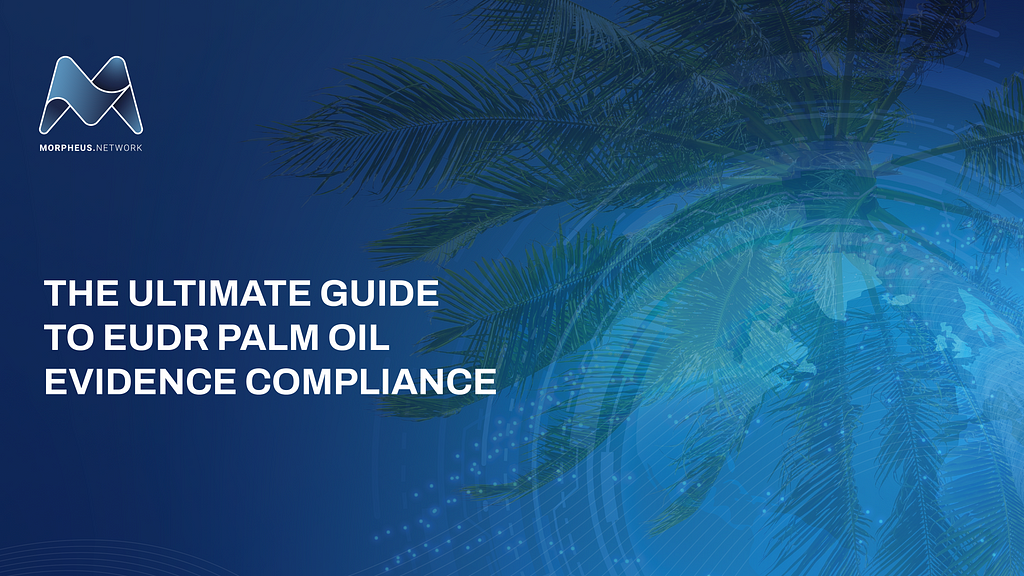The Ultimate Guide to EUDR Palm Oil Evidence Compliance
0
0

Palm oil is a key ingredient in many products but its production has serious environmental consequences. Palm oil production often involves the conversion of natural forests into agricultural land, leading to deforestation and habitat loss. The European Union Deforestation Regulation (EUDR) aims to address these issues by enforcing strict compliance rules. Palm oil production and the use of palm biodiesel contribute significantly to carbon emissions, exacerbating global climate change. This guide will cover everything you need to know about palm oil types, uses, and how to meet EUDR requirements.
Overview of Top Palm Oil Products

The oil palm tree, scientifically known as Elaeis guineensis, is the source of various palm oil products that are integral to global food supply chains. With palm oil supplying 40% of the world’s vegetable oils demand, understanding the different types of palm oil products, including cooking oil, is essential for businesses and consumers alike.
- Best for Cooking: Crude Palm Oil
- Best for Personal Care Products: Palm Kernel Oil
- Best for Sustainable Practices: RSPO Certified Palm Oil
- Best for High-Temperature Cooking: Refined Palm Oil. Its stability at high temperatures makes it ideal for producing crispy and crunchy fried products.
- Best for Food Processing: Palm Stearin
What is EUDR and what must the Palm Oil Industry do to be permitted to import their products into the EU?
The European Union Deforestation Regulation (EUDR) is a pivotal piece of legislation aimed at curbing the import of products linked to deforestation. For the palm oil industry, this regulation introduces stringent requirements to ensure that palm oil is sourced sustainably, as emphasized by the European Commission.
The EUDR mandates that operators must demonstrate that palm oil is sourced from areas not contributing to deforestation since December 31, 2020. This applies to both EU-produced and imported products, making it essential for businesses involved in the palm oil supply chain to comply with these regulations. The supply chain includes various stages such as sourcing, processing, storage, and delivery to customers.
Operators must trace the product’s origin and assess non-compliance risks, maintaining records of diligence requirements due diligence requirements statements for five years. Each company involved in the palm oil supply chain, from harvesters to traders, must ensure legal compliance and traceability throughout their operations.
For palm oil sourced from high-risk regions, operators must provide additional verification and mitigate risks as part of their compliance obligations. This comprehensive approach aims to ensure that the palm oil entering the EU market does not contribute to deforestation. Choosing the right supply chain model is essential for meeting EUDR requirements and optimizing operations.
Businesses must adopt robust material handling and business logistics manufacturing processes aligned with best practices to comply with the EUDR. Manufacturers must ensure the quality of raw materials and components to maintain product integrity. This not only helps in storing raw materials and meeting regulatory requirements but also enhances companies’ reputation and trust among consumers regarding raw materials while managing inventory. Managing supplies efficiently is crucial to avoid disruptions in production and delivery. Reliable components are essential for smooth production processes and maintaining product standards. Supply chain logisticians play a crucial role in this alignment, especially when it comes to optimizing logistics management at the distribution center to improve efficiency for finished products and streamline the business process to convert raw materials. Distribution centers serve as key locations for storing finished products before they are delivered to customers or retailers. Efficient distribution networks are crucial for moving products from distribution centers to retailers or customers, ensuring timely and cost-effective delivery. Negotiating effective logistics deals is important to ensure timely and cost-efficient delivery of goods. Logistics services are vital for planning and controlling the movement of goods within the supply chain. Customer service also plays a significant role in maintaining efficient supply chain operations and enhancing customer satisfaction.
In terms of sustainability and compliance, palm oil is often compared to other vegetable oils such as soybean and sunflower, as it offers higher yield and greater land use efficiency, though it also raises concerns regarding deforestation and human rights.
Supply Chain Management for EUDR Compliance
Effective supply chain management is at the heart of EUDR compliance for the palm oil industry. Companies operating in palm oil producing countries must establish robust systems to track the journey of crude palm oil and palm kernel oil from plantation to final product. This involves not only managing inventory and monitoring logistics but also ensuring that every supplier in the supply chain adheres to sustainable production practices.
Supply chain managers play a key role in coordinating with logistics management teams to verify that all raw materials are sourced responsibly and that transportation processes do not contribute to deforestation or habitat loss. By implementing advanced supply chain management strategies, companies can minimize compliance risks, streamline business logistics, and maintain a competitive advantage in the global market. Proactive management of suppliers and inventory ensures that the palm oil industry continues to meet both regulatory requirements and consumer expectations for sustainable production.
Best Sustainable Palm Oil — RSPO Certified Palm Oil
Certified sustainable palm oil, particularly that which is RSPO certified, stands out as the gold standard for responsible production in the industry. The Roundtable on Sustainable Palm Oil (RSPO) sets rigorous criteria to ensure that palm oil is produced without contributing to deforestation, while also protecting natural habitats and supporting fair labor practices. By choosing RSPO certified sustainable palm oil, companies demonstrate their commitment to reducing greenhouse gas emissions and supporting sustainable production methods.
Organizations such as the food and agriculture organization and other agriculture organizations strongly advocate for the use of certified sustainable palm oil to help combat biodiversity loss and ensure compliance with national laws. For companies, adopting RSPO certified palm oil not only supports environmental and social goals but also enhances brand reputation and builds customer trust. As the industry moves toward more sustainable practices, RSPO certification is increasingly recognized as a mark of quality and responsibility in palm oil production.

For example, Unilever has successfully implemented RSPO certification across its supply chain, demonstrating how large companies can achieve sustainable sourcing at scale.
Having used RSPO-certified palm oil in various food supply chains, I can attest to its superior quality and sustainability. The certification models, such as Identity Preserved and Mass Balance, offer flexibility in sourcing, ensuring that brands can trace their supply chains and verify ethical practices. However, the higher costs and rigorous compliance requirements can be challenging for some businesses. Examples of common obstacles include increased operational costs and the need for complex documentation to meet certification standards.
Risk Assessment and Mitigation Strategies

In the palm oil industry, conducting thorough risk assessments and implementing effective mitigation strategies are essential steps toward sustainable palm oil production. Supply chain logisticians must identify and address risks such as deforestation, destruction of natural habitats, and labor exploitation within their supply chains. This process involves regular audits, close monitoring of supplier performance, and strict adherence to due diligence requirements set forth by the European Commission.
Companies must ensure that their logistics management systems are designed to prevent unsustainable practices and support responsible production. By proactively managing risks and maintaining high standards throughout the supply chain, businesses can protect their reputation, avoid regulatory penalties, and contribute to a more sustainable industry. Adopting these best practices not only fulfills compliance obligations but also positions companies as leaders in sustainable palm oil production.
What Are the Top Softwares Available to Be RSPO Compliant?
To streamline RSPO compliance and enhance supply chain management, companies can leverage a range of advanced software solutions. The top five options include:
Comparison Summary
- Best for Affordability & Integration: EUDR.Supply stands out with its low cost, strong interoperability, and ease of use, especially for companies focused on compliance without large-scale infrastructure investment.
- Best for Large Enterprises: SAP and Oracle offer deep functionality but come at a high cost and require more onboarding.
- Balanced Options: Infor, JDA, and Manhattan Associates offer strong mid-tier solutions for companies with existing ERP systems.
By adopting these software solutions, companies can enhance their logistics management, streamline compliance processes, and maintain a competitive edge in the palm oil industry.
Understanding why it’s important to have Digital Product Passports of all of your compliance evidence
Digital Product Passports (DPPs) are essential for gathering and sharing extensive data about a product’s lifecycle. Both regulatory and brand-driven DPPs require effective data management to ensure compliance and transparency regarding a product’s environmental impact.
The regulatory DPP mandated by the EU emphasizes the need for detailed product information and relevant information to facilitate a circular economy. This enhances supply chain transparency, helping stakeholders verify sustainable practices in product sourcing and manufacturing.
Implementing DPPs allows manufacturers and retailers to build trust with consumers, potentially leading to increased loyalty and new revenue opportunities. Leveraging new technologies for managing and sharing sustainability data ensures the information remains accurate and trustworthy.
Incorporating DPPs into your supply chain management not only meets regulatory requirements but also provides supply chain managers with a competitive advantage by demonstrating your commitment to sustainability.
Transparency and Reporting Requirements
Transparency and robust reporting are fundamental to sustainable palm oil supply chains under the European Union’s Deforestation Regulation (EUDR). As of December 30, 2024, large enterprises must be fully compliant, while micro and small businesses have until June 30, 2025 to meet the same requirements. Companies must provide verifiable documentation on the origin of palm oil, supplier details, and the measures taken to prevent deforestation and promote sustainable production.
Regular reporting on progress toward RSPO certification and adherence to national laws is mandatory. The United Nations and other global industry bodies emphasize the importance of transparent, accountable practices — including third-party audits and public disclosure of sustainability efforts. By prioritizing these requirements, companies can strengthen customer trust, enhance brand reputation, and drive real impact across the industry. For managing directors and senior executives, meeting these expectations is not only a regulatory obligation but a strategic imperative for long-term success.
Summary
Navigating the complexities of EUDR compliance in the palm oil industry requires a comprehensive understanding of sustainable practices and the right tools to ensure transparency and traceability. By prioritizing RSPO-certified palm oil and leveraging advanced software solutions, businesses can meet regulatory demands and contribute to a sustainable future.
In conclusion, the path to sustainability in the palm oil industry is paved with challenges, but with the right knowledge and tools, it’s possible to make a significant impact. Embrace the journey towards sustainability, and let your commitment inspire others to follow suit.
Frequently Asked Questions
What is the EUDR?
The EUDR, or EU Deforestation Regulation, is designed to prohibit products linked to deforestation from accessing the EU market. Its primary goal is to promote sustainable consumption and protect global forests.
Why is RSPO certification important?
RSPO certification is crucial because it guarantees that palm oil is sourced sustainably, promoting environmental protection and ethical practices. By obtaining this certification, businesses can demonstrate their commitment to responsible sourcing and support for sustainable agriculture.
What are Digital Product Passports (DPPs)?
Digital Product Passports (DPPs) facilitate the collection and sharing of comprehensive data on a product’s lifecycle, empowering consumers to make informed choices related to sustainability and disposal.
How can businesses comply with EUDR?
To comply with the EUDR, businesses must conduct due diligence to trace product origins, evaluate compliance risks, and maintain detailed records for five years to ensure traceability.
What software tools are available for RSPO compliance?
For RSPO compliance, EUDR.Supply, SAP, Oracle and Blue Yonder (JDA SCM) are leading software tool that provides extensive features for managing sustainable sourcing effectively.
About Morpheus.Network
Morpheus.Network is intensely focused on helping companies and government organizations eliminate inefficiencies and remove barriers to optimize and automate enterprise supply chain operations. Their multi-award winning supply chain middleware platform leverages transformational digital technologies such as ML/AI, IoT and Blockchain and has over 150 integrations with leading companies, including SAP, DHL, Fedex, Cargowise, Dimitra, Telefonica, Marsh, Swift and more! Morpheus.Network helps clients maximize revenue through digitization and process automation, protecting sensitive data, and untangling complex issues with the legacy supply chain system while delivering effective, equitable, and efficient global trade solutions.
“If you fix the supply chain, you fix the world!” — Dan Weinberger CEO & Co-Founder
Connect with one of our specialist to discuss finding solutions for your supply chain challenges
Join the conversation Follow us on Social Media!
Website | Telegram | Twitter | LinkedIn | Facebook | Instagram | Discord | Warpcast
The Ultimate Guide to EUDR Palm Oil Evidence Compliance was originally published in Morpheus.Network on Medium, where people are continuing the conversation by highlighting and responding to this story.
0
0
 Administra todas tus criptomonedas, NFT y DeFi desde un solo lugar
Administra todas tus criptomonedas, NFT y DeFi desde un solo lugarPara comenzar, conecta de forma segura el portafolio que estés utilizando.